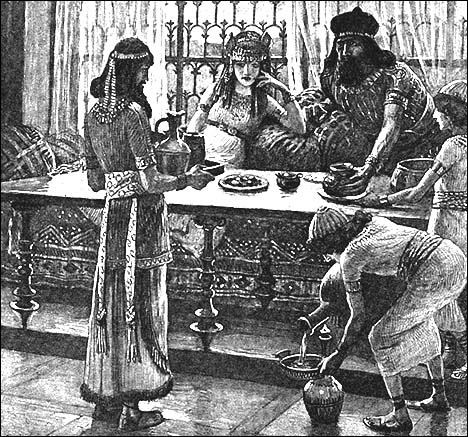 | |
|
OLD TESTAMENT PARENTHESES (18)
"(Now I was cupbearer to the king)" Nehemiah 1:11 R.V.
THIS sentence is placed between brackets in my Bible, though not in some other versions. Nevertheless it seems worthy of a place among our collection. It follows an eloquent and moving prayer. It also precedes a bold action. Prayers should be the basis of our actions but never an excuse for inaction.
WHEN Nehemiah had finished praying he seems suddenly to have recalled his personal condition: "Now I was cupbearer ...". It may be that he was appalled at his own helplessness. What hope had a man in his position of ever being able to go off to join the returned exiles in Jerusalem? Moreover, what could his type of man contribute to the work of recovery? What could a soft palace official do in the great task of conflict and re-building?
ALL of us know the feeling of hopelessness which can come over us when, after rising to great heights in our prayers, we come down to earth and realise what poor material we are for the great work about which we have been praying. Whether this is what happened or not, it is certainly true to experience.
THERE is, however, another explanation of Nehemiah's parenthetical note. It may be that he realised that the unattractive job which had been forced upon him could be the very key to Jerusalem's problem. In his position of trust in the palace, he could perhaps gain the King's ear and speak up for the interests of his God.
HE had been praying for some months when he came to the day of resolution. "... prosper, I pray thee, thy servant this day ...". The king, after all, was only a man, whereas his Lord was "the God of heaven" (2:4).
SURE enough, that very day the occasion arose for him to lodge his appeal. He apparently showed signs of his inner tension, for prayer does not always free us from natural emotions, but the Lord used this to arouse the suspicions of the king and provoke the question which led to his release for the task. So, in answer to prayer -- both the laboured intercessions of the months and the ejaculatory petition of the moment -- the king's butler became the Lord's master-builder.
LATER, when Nehemiah wrote this story, he must have looked back in wonder. He had not had to break away from his palace job -- indeed he could not do so -- but prayer had released him and set him on his way of service for God. He thought of what he was -- cupbearer to a heathen king; and then what God had made of him -- an honoured instrument for the recovery of the Lord's testimony in the earth.
THERE seems to be no limit to God's power. It does not matter what we are in ourselves; what is all important is what God can make of us if we only persevere in the place of prayer.
No comments:
Post a Comment